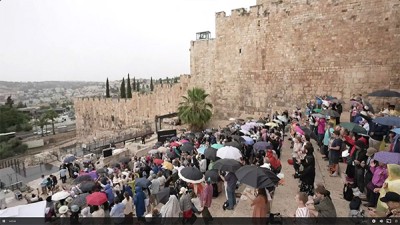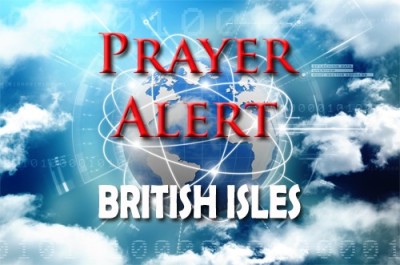Afghanistan: two earthquakes within a week
12 Oct 2023A 6.3 magnitude earthquake has struck western Afghanistan, four days after a series of deadly quakes left at least a thousand people dead. This second earthquake struck an area near Herat early on 10 October. There are conflicting reports about the number of casualties: one spokesperson reported at least 120 injured. It flattened all 700 homes in Chahak village, which was untouched by Saturday’s quakes. Rescue workers and volunteers have been working around the clock to try to dig out survivors and bodies from the ruins of the villages since the weekend. Relief efforts have been hampered by poor infrastructure in the impoverished country, following decades of war and a decline in foreign aid.
Algeria: church leader convicted
12 Oct 2023Church leader Rev Youssef Ourahmane has been convicted of holding an unauthorised religious assembly and sentenced to two years’ imprisonment and a fine equivalent to approximately £600. He is vice-president of the Èglise Protestante d’Algérie (EPA), an association of around 45 Algerian churches which have been suffering under a severe crackdown that began in 2017. Many EPA-affiliated churches have been forced to close. In March 2023 a small number of Christian families spent three days in a church compound under Rev Youssef’s supervision. The small church in the compound had been sealed by order of the provincial governor in 2019. The pastor was charged with holding an unauthorised religious assembly and holding worship in a building not permitted for worship. He was convicted in absentia and was not informed of the court hearing or the verdict until mid-September. He has appealed the verdict: a hearing date has been set for 19 November.
Tension is rising in Guatemala, where protests by supporters of president-elect Bernardo Arévalo have run into a second week. They are demanding the resignation of attorney-general Consuelo Porras, who they accuse of plotting to prevent Mr Arévalo from taking office. He won the presidential election by a landslide in August, but just hours later his party was suspended by the supreme electoral tribunal - a move widely viewed as an attempt to stop Mr Arévalo, a political outsider who has campaigned against corruption, from being sworn in as planned. Ms Porras argues that the party was not properly registered, but critics point out that she only launched her investigation after Mr Arévalo secured a spot in the run-off. The protests intensified last week as demonstrators blocked key roads across the country, causing fuel and food shortages and paralysing traffic. The outgoing president, Alejandro Giammattei, condemned the blockades, and asked Mr Arévalo to sit down with mediators sent by the Organisation of American States (OAS), to ensure a peaceful handover of power.
We sense this is a key moment for the body of Christ to release a call to 21 days of focused prayer on behalf of Israel: Jews, Arabs and Internationals – Oct 11th to Nov. 1st.
We want to pray for a Great Harvest and for the Peace of Jerusalem
In light of recent signs that I have shared - of a significant harvest emerging in the Middle East, and Israel now at war, we want to contend for the Gospel of the Kingdom to be proclaimed with demonstrations of power and love throughout the land of Israel.
Our of our partner ministries has hundreds of volunteer laborers prayer walking and sharing the message of Hope in Jesus across Israel this month. Their assignment has heightened importance due to the war. They are finding that people are more receptive than ever to the Gospel - but they need our prayers!
Will you pray with us for these Laborers, for a massive Harvest - and for Peace?
As the Lord leads you, would you consider praying each day for 21 days in your home, church, house of prayer, workplace, or prayer tower on behalf of the nation and peoples of Israel.

12:11 – HOW TO PRAY
We invite you to set your alarm for 12 Noon each day and pray for 11 minutes (minimum) using the 12 prayer points below – a Revelation 12:11 call to pray!
“And they have conquered him by the blood of the Lamb and by the word of their testimony, for they loved not their lives even unto death” Rev 12:11 (ESV)
You may also consider fasting – a Daniel Fast – 21 days of no meats or sweets – as the Lord leads you!
Here are some prayer points to help guide your prayers:
EXALT JESUS!
- Pray for Jesus Christ to be exalted as King and take His rightful inheritance in the land! Ps. 2, 110
PRAY FOR THE HARVEST
- Pray for laborers to be sent forth throughout the land of Israel who will overcome Satan by the blood of the Lamb, the word of their testimony and laying down their lives even unto death” (Rev. 12:11)
- Pray for the Lord to remove the blindness that the God of this age has placed over the minds of the unbelievers that they might see the Light of the Gospel in the face of Jesus! 2 Cor. 4:4-6
- Pray for Open Doors for the Gospel in the hearts of men, both Jews and Arabs in the land. Co. 4:2-4
- Pray for signs, wonders and miracles throughout the land of Israel! Acts. 4:29-31, Micah 7:15, Acts 2:17-21
PRAY FOR PEACE
- Pray for the Peace of Jerusalem and an end to war and bloodshed. Pray for this war to be ‘restrained and contained’ and not pushed into a larger regional or global war - Psalm 122
- Pray for the Lord to rebuke the enemy, bind the spirit of violence, and rage, and cast down the accuser of the brethren.
- Pray for the poor and vulnerable ones in the midst of war who are suffering and grieving.
- Pray for those being persecuted for the Gospel to remain loyal in their love and allegiance to Jesus, even in the face of Satan’s most severe persecutions.
- Pray for governmental leaders to have wisdom walking in the ‘fear of the Lord’ 1 Tim. 2:1-2
PRAY FOR ISRAEL
- Pray for a global ‘gift of tears’ to be released to the body of Christ, as we cry out for mercy on behalf of Israel, Ps 126:5-6 (See Video)
- Pray for the Highway of Holiness, from Egypt to Assyria to Israel to be established, Isaiah 19:23-25
May the Lord call us to a Revelation 12:11 lifestyle – Soaked in the Blood, Strong in Witness, Sacrificial in Life. (See Video)
For the Glory of the Lamb,
Dr. Jason Hubbard – Director
International Prayer Connect
I'm bringing you this urgent call to pray with us for the serious situation in Israel.
Saturday 7th October, there was a surprise early morning cross-border attack by Hamas militants on Southern Israel. Palestinian militant group Hamas breached the border fence and sent in fighters by land and some by motorised hang-gliders under the cover of an unprecedented barrage of 2,500+ rockets. Some rockets reached as far as Tel Aviv. A hospital, a synagogue and homes have been hit.
This is reported to have caught the Israeli military 'off guard'. 350 Israeli civilian lives have been lost, 1,500 wounded and dozens have been taken hostage by Hamas. The Israeli army are actively restoring order in 20+ settlements that the terror group had infiltrated.
Israeli Prime Minister, Benjamin Netanyahu declared "We are in a war". He ordered strikes on Gaza and called for an "extensive reserve mobilization" as the nation responds to the unprecedented incursion."
The Israeli military retaliation started with pin-point targeted bombings on Hamas infrastructure and is gearing up to invade Gaza. Medical sources say there have been 232 Palestinians killed and more than 1,000 wounded.
I am sure that we are all praying for peace at this time (Psalm 122). Here are a few prayer pointers that I trust will help guide your intercessions:
Watch this Video
Firstly, by way of scene setting, I would invite you to watch this short video message that I recorded near Christ Church, Jerusalem, at Pentecost 2023.
Psalm 126 says that those who sow in tears shall reap with shouts of joy. I have a strong sense that this situation will require desperate prayer for a breakthrough. I believe that we need to weep with God's heart in order to reap a harvest.
From Rick Ridings
Focusing on the situation on the ground... we hear from Rick Ridings, who leads Succat Hallel - a 24/7 house of prayer that overlooks Temple Mount, Jerusalem:
- The Lord had given me a strong word for this season, that we are to pray to ‘contain and restrain' regional conflicts so that they do not escalate into a premature World War 3 that would greatly hinder the Great Harvest. So pray that this situation will be 'contained and restrained', especially that Hezbollah will not join in on the conflict and start firing rockets upon the North of Israel; that Israeli Arabs will not continue to join in with isolated attacks on individuals, etc. Pray for great wisdom for the military and governmental leaders
- Pray protection in a special way over the most vulnerable areas close to Gaza. We have a good friend who pastors a messianic Jewish community in Sderot, where some of the hostages were taken. Pray protection for them. Pray for miraculous rescues of hostages that were taken by Hamas.
- Pray also for Succat Hallel for protection over the watches, and for the watchmen coming and going. The voices of opposition are literally in our streets. Pray that the Lord will give us both courage and wisdom. Heidi Baker had been scheduled to minister to our Jewish and Arab youth, but had to cancel so she could stay close to the students she has here at this time.
Prayer Pointers
1. Pray for Peace and Protection (Psalm 91:1-2)
Pray for the people of Israel and Gaza, that God will grant them His divine protection and bring peace to this troubled region. Shield them with your wings, O Lord, and keep them safe in your refuge. Comfort those who have lost loved ones.
2. Prayer for the Hostages (Psalm 34:17)
Lord, we lift up the hostages, including women and children, being held in Gaza. We ask for their safe release and that you comfort them in their distress.
3. Prayer for Leaders' Wisdom (James 1:5)
Heavenly Father, grant wisdom and discernment to Prime Minister Benjamin Netanyahu and all leaders involved in making decisions during this challenging time. May they seek your guidance in every step.
4. Prayer for Civilians in Gaza (Psalm 46:1)
We pray for the innocent civilians in Gaza who are suffering. Have mercy on them and provide for their needs.
5. Prayer for an End to Violence (Matthew 5:9)
Prince of Peace, we cry out for an end to the violence and bloodshed. Bring about reconciliation and understanding among conflicting peoples. May your peace prevail.
6. International Leaders (1 Timothy 2:1-2)
We pray for world leaders, including President Joe Biden and leaders in the Middle East. May they work towards a peaceful resolution and support efforts to bring an end to this conflict.
7. Prayer for Healing and Unity (2 Chronicles 7:14)
Heavenly Father, we humble ourselves and seek your face. Heal the land, bring unity among people, and let your love shine through even in the darkest of times. In Jesus' name, we pray. Amen.
Prayer Initiatives in Jerusalem
IPC is aware of significant prayer initiatives taking place in Israel at this time. Pray for the safety and protection of all of those taking part as well as insight and wisdom for them as they intercede.
More info:
For more background and briefing on the situation see:
https://www.aljazeera.com/news/2023/10/7/palestinian-group-hamas-launches-surprise-attack-on-israel-what-to-know
https://www.jpost.com/israel-news/defense-news/2023-10-07/live-updates-762053
https://www.bbc.com/news/live/world-middle-east-67037895
https://t.me/s/beholdisraelchannel
It's a serious situation, but King Jesus is also right there and seated on the throne.
Our Worship, Praise and intercession are powerful - to drive back the enemy and see the Kingdom of God take ground even through these shakings.
Thank you for partnering with us in prayer for the nations - ‘Exalting Jesus, catalysing united prayer across nations, denominations, movements, and generations for the fulfilment of the Great Commission.'
Every blessing,
Dr Jason Hubbard - Director
International Prayer Connect
Boys’ Brigade celebrates its 140th anniversary
06 Oct 2023The Boys' Brigade, founded in Glasgow in 1883 by Sir William Alexander Smith, marks its 140th anniversary as the world's first uniformed youth organisation. With a presence in sixty countries and over half a million members, it has remained committed to instilling Christian values in young lives. Regular gatherings involve Bible studies, prayer sessions, church services, and recreational pursuits. The late Queen Elizabeth II was their patron, a testament to the organisation's royal support. In honour of this milestone, the Boys' Brigade will plant an oak tree to commemorate its founder's legacy in a Heroes of the Faith woodland near Birmingham. This gesture symbolises the growth and steadfastness of the organisation over the years.
China: transformation through Bible outreach
06 Oct 2023In the turbulent period of the Cultural Revolution in China, Bibles were confiscated, and churches forcibly closed. However, the Bible's journey has now evolved from being an underground rarity to becoming a cherished bestseller. Since 1987, the presence of the Bible Society's Amity Press in Nanjing has been nothing short of remarkable. This facility, the largest Bible factory in the world, has produced an astounding 90 million Bibles for dissemination within China, and 140 million copies in various languages for global distribution. The open availability of the Bible through authorised channels has played a pivotal role in the astonishing growth of the Chinese Church. Lay leaders and devoted volunteers often step forward to bridge the leadership gap, particularly in less affluent regions where a single ordained pastor may serve more than six thousand Christians. The Chinese Church's ongoing growth reflects the abundant harvest that Jesus spoke of in Matthew 9:37, where the workers are indeed few but filled with boundless devotion.
HS2 northern leg cancelled
06 Oct 2023Rishi Sunak has faced sharp criticism for cancelling the northern leg of HS2, but he refuses to apologise. The PM defended the decision, stating that the cost had doubled, and he believes the new plan will benefit more people and places. He emphasised that the £36 billion saved from this project would be reinvested in various forms of transportation and across the country. While some expressed concerns about the impact on investors and the stop-start approach to infrastructure projects, Sunak disagreed and believed that it wouldn't deter investments. In his speech, Sunak positioned himself as a leader of change despite his party's long tenure in power. His decision to cancel the northern leg of HS2 has met with mixed reactions, with some northern leaders feeling left out of the process and others questioning the funding and strategic planning of alternative transport schemes.







